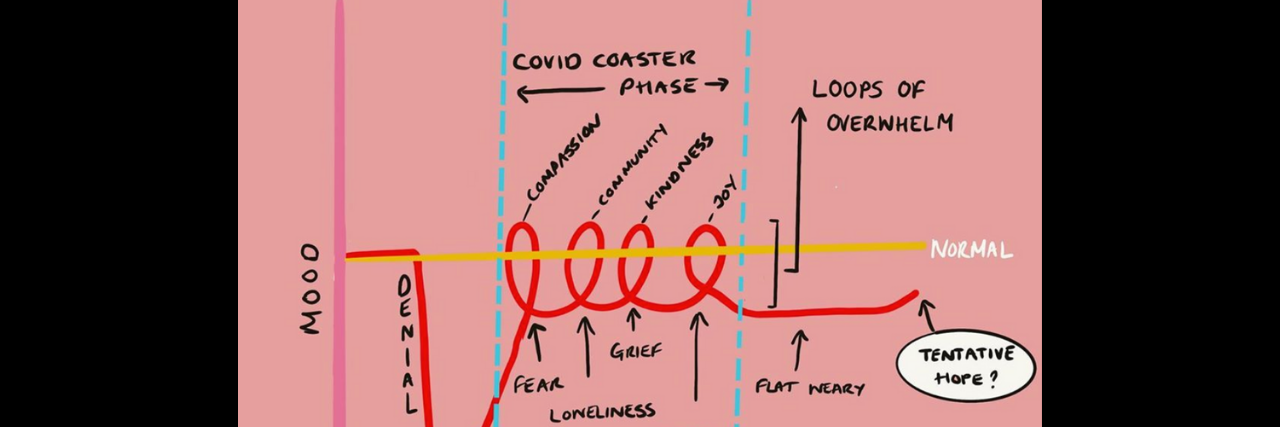If Your Mental Health Has Been on a 'COVID-Coaster' This Emotion Chart Is for You
Editor's Note
Join The Mighty’s Coronavirus group to connect with other Mighties living through the pandemic. Read the latest updates, share helpful tips, or give and receive virtual support.
If you’ve been anything like me during the coronavirus pandemic, your emotions will have been all over the place. Whether you’re a key worker on the frontline of the crisis or a single mum trying to juggle homeschooling responsibilities while you work from home, we have all had to put a halt to our normal lives and been forced to adapt to a whole new world on a both practical but also emotional level.
Just recently, I’ve found drawing a really cathartic way to help me manage some of these swirling emotions. So a couple of days ago I created the “Corona Emotion Graph” to share some of the stages my feelings have gone through in the past few weeks and shared it on my Instagram. I have had a huge response to it and it seems many people have been feeling similar.
The graph starts at “normal” — which will be different of course for each person — but quickly plummets into the “denial” phase as news of the coronavirus starts to slowly infiltrate my consciousness. But news reports from other countries with their mounting death tolls were scary and shocking, yet still far enough away from my reality for me to keep my head in the sand.
The lockdown announcement marks the end of the denial phase and coincides with “peak anxiety” as reality hits me smack in the face and in a heartbeat, it feels as if life as I know it has changed. Fight or flight reactions fizz around my body for days. I can’t sleep, I constantly refresh the news, I worry about my loved ones, our health, our financial security and pretty much every area of our lives.
The next phase has felt the longest and the bumpiest, I’ve been calling it the “COVID-coaster” or “roller-corona,” as it feels like I’ve been riding an exhausting roller coaster of emotion. Feeling a strange kind of joy at the slow pace of life, yet fearing the unknown of this limboland. Experiencing the dark loneliness of lockdown, but seeing the compassion and kindness of so many people shining through. Feeling grateful for my health, family and job, but also feeling intense stress, grief and irritability. And then all the guilt for feeling bad when so many have it worse. Round and round these emotions have gone, with no way to get off the ride, which is why I’ve also labeled them “loops of overwhelm.”
I then moved into a phase of feeling flat weary. The high frenetic energy of the past few weeks proved impossible to keep up longer term and so has been replaced by a drained limbo, but with the smallest glimmer of tentative hope on the horizon.
Since drawing and sharing this graphic however, I’ve found that cautious optimism has been joined by some nerves and trepidation about leaving the cocoon of lockdown and anxiousness about what the next phase of “new-normal” will look like.
What sharing my graphic has done has shown me how many other people have felt the same or very similar. It shows us that these are completely normal responses to an extraordinary situation, and we do not need to feel guilty or bad about what we are feeling.
No one knows when the threat of the virus will completely leave our lives. The only thing guaranteed is that we’re in this situation for the long-haul, so identifying what we are feeling, talking about them and trying to adapt to some of the changes as best we can is crucial for protecting our mental health.
Struggling with your mental health due to COVID-19? The following stories from our community might help:
- 7 Things to Do If Social Distancing Is Triggering Your Depression
- What to Do If the Coronavirus Health Guidelines Are Triggering Your Anxiety or OCD
- How Can You Tell the Difference Between Anxiety and COVID-19 Symptoms?
- You Don’t Have to Be the ‘Perfect Pandemic Parent’
- Why I’m Inspired by This ‘Hard Email’ a Mom Sent About COVID-19 and School Work
- Feeling Calm in the Midst of the Coronavirus Pandemic Might Be a Trauma Response
Header image via @jo__love__

